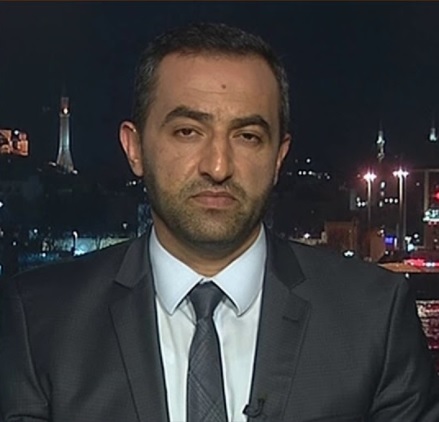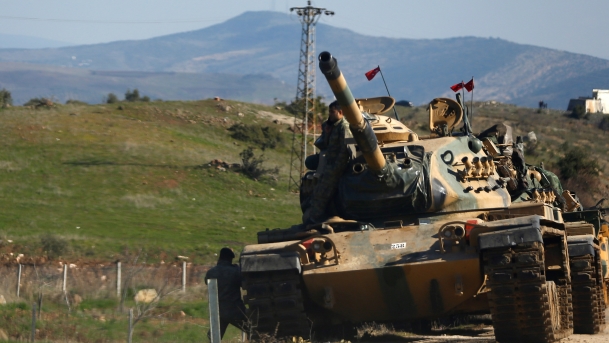
After the demise of ISIS (Daesh), the Syrian Democratic Forces (SDF) led by the People’s Protection Units (YPG) expanded their control of almost one-third of the Syrian soil along the border with Turkey (1). Turkish President Recep Tayyip Erdogan has reiterated his country cannot and will not allow any de facto autonomous entity for these elements across the border. The dynamics on the ground have been relatively complicated, still in favour of Turkey to embark on its military operation termed as ‘Spring Peace’. This paper probes into the Turkey’s motives behind its cross-border operations in northern Syria. It also examines the role of the U.S. as Turkey’s NATO ally and main supporter to YPG, Turkey’s foe. It examines the power shift and who became the main influential power in Syria. Finally, it addresses the stances of the regional powers including the Arab League, Israel and Iran and the drivers of their disagreement and criticism against the Turkish operation.
Principally, Turkey designates the SDF as an extension to the banned Kurdistan Workers’ Party (PKK). SDF has repeatedly failed to distance itself from the mother umbrella organization PKK and former U.S. Defense Secretary, Ashton Carter, confirmed “substantial ties” between the YPG and the PKK (2). Thus, Turkey’s war is against the outlawed PKK, which emerged in 1978, embracing both Kurdish nationalism and socialist ideology with the goal of establishing an independent Kurdish state. The PKK has pursued an armed struggle against the Turkish Republic since 1984; their attacks have killed about 40,000 people. The PKK has been designated as a terrorist organization by the United States, 28 European countries, and Japan (3).
Interestingly, Turkey is a close friend to the Iraqi Kurdistan Regional Government (KRG), which is the Kurdish-populated region incorporated into Iraq and recognized by the Iraqi constitution as an autonomous region. Thus, if Turkey’s war is against the Kurds as the mainstream international media outlets try to promote, then why does Turkey maintain strong economic and political relations with the KRG? Before the contentious independence referendum for Kurdistan Region of Iraq in September 2017, the then-Kurdish President of the KRG, Masoud Barzani, was received in Ankara in formal and cordial diplomatic protocols of receiving presidents of states (4).
Turkey’s cross-border military operations really have to do with the threat paused by the terror groups, they are not against the Kurds or any other minority. However, the Turkish military operation was contested by several regional leaders.
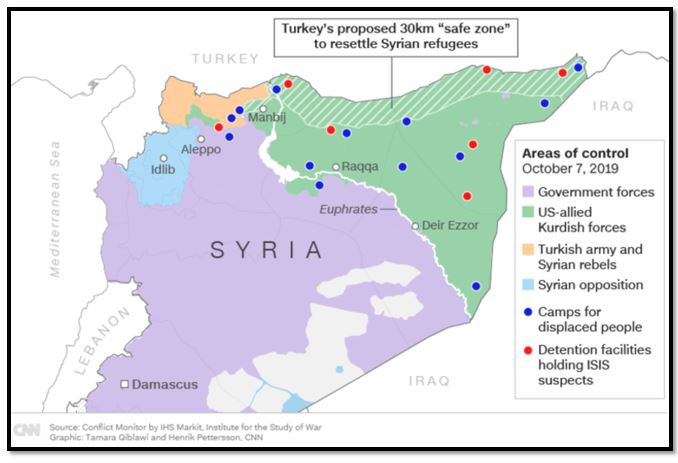 |
| Turkey's Proposed “Safe Zone” to Relocate Syrian Refugees [Institute for the Study of War] |
The European Union's foreign affairs chief, Federica Mogherini called on Turkey to stop its military action in Syria and underscored that "Military action will indeed undermine the security of the coalition's local partners and risk protracted instability in northeast Syria, providing fertile ground for the resurgence of Daesh.” British Foreign Secretary Dominic Raab said the Turkish action "risks destabilizing the region, exacerbating humanitarian suffering, and undermining the progress made against Daesh."
Israel's Prime Minister Benjamin Netanyahu was also quick to denounce it in a tweet; "Israel strongly condemns the Turkish invasion of the Kurdish areas in Syria and warns against the ethnic cleansing of the Kurds by Turkey and its proxies." In Cairo, Assistant Secretary General of the Arab League, Hossam Zaki, said the Turkish campaign "constitutes an unacceptable attack on the sovereignty of an Arab member state of the League."
If their aspiration of those groups like the Syrian Democratic Forces materializes, it will be far bigger than a security risk to Turkey, it is rather an existential threat. Such an entity would give much more momentum to the PKK-led insurgency in Turkish town and cities close to the borders with Syria to claim self-determination and independence. Most of these border provinces are heavily populated by the Kurdish minority that have been terrorized by the PKK through the forcible recruitment of their children. Former German foreign minister, Sigmar Gabriel, accused the PKK of trying to finance a possible civil war in Turkey through the money it gets from arms and drug smuggling in Germany. He also asserted that the terrorist group was outlawed in Germany for that same reason (5).
For Turkey, the landscape on its border with Syria is a key factor in its calculus when assessing the imminent threat of the settlement of such armed groups in the region. The swathes of land, along the border between Turkey and the Syria, are largely flat fertile plains. In its previous cross-border operations, ‘Euphrates Shield’ in 2016 and ‘Olive Branch’ in 2018, Turkey aimed to push the YPG militants back from the border and establish a buffer zone that could accommodate Syrian refugees. The recent operation ‘Peace Spring’ aims to expand that buffer zone and use some of this territory to resettle some 2 million of the 3.6 Syrian refugees who fled to Turkey since the start of the Syrian War. By doing so, Turkey establishes a populated buffer zone that prevents the merger of the border cities and the rising demands of separation among its Kurdish citizens in those cities. This concern is not relevant when it comes to the Iraqi Kurdistan Region Government (KRG) since the region is largely a mountainous area and its geography has created a natural border between Turkey and KRG (6).
 |
| Turkey's Plan for northern Syria [Anadul Agensi] |
Trump’s Non-Interventionist Doctrine
Before 2016, President Erdogan has reportedly asked his military forces to intervene in Syria to establish a safe zone. But, his plans were opposed by both the then-Obama administration and the Turkish military establishment. Erdogan did not yet have complete control over his military led then by Turkish generals who were allegedly loyal to the Fethullah Gulen movement, which the Turkish government accuses of orchestrating the thwarted coup attempt in 2016 (7).
The previous U.S. administration’s strategy in Syria was confusing. President Obama did not adopt regime change strategy, especially after what was considered America’s fatal mistake in Libya that led to the ousting of Moammar Qaddafi. Though the Obama administration publically proclaimed it did not seek to get involved in Syria, it did not allow Turkey to handle the rising threat of militia organizations such as Daesh. It considered YPG to be its ally and promoted it as the most effective partner in Syria in the campaign against Daesh. It provided the group with arms and ammunition in addition to logistic and training services (8).
When Trump succeeded Obama, he promptly adopted a policy of pulling out from Syria after defeating Daesh. He initially ordered the withdrawal of 2,000 American troops from Syria in December 2018. His abrupt proclamation brought a storm of protest in Congress, even among his Republican staunchest allies like Senator Lindsey Graham, who said he was “blindsided.” Democrats stated Trump had acted out of “personal or political objectives” rather than national security interests (9). It was almost a year after Trump’s decision to withdraw the troops from Syria when a sudden Sunday-night statement came out from the White House, announcing Turkey was set to embark on its operation in north-eastern Syria and the U.S. troops will not get involved. The decision triggered deep bipartisan resentment since Trump’s green light was perceived as betrayal of the Syrian Kurds, the U.S. best partner in the fight against Daesh (10).
For some, Trump’s decision was a sad irony since it would substantively infringe the establishment’s foreign policy that calls for reducing the U.S. military presence abroad. The move undoubtedly set up a precedent pattern that the United States is not a trustworthy ally and that its inconsistent strategy is likely to imperil other strategic ties with regional powers especially in the Gulf. Thus, it is not the non-interventionist policy that should be criticized, it is rather the incoherence of the U.S. friendships. Trump has promoted himself as a leader who would effectively protects his troops from being caught in the crossfire between the Turks and the Kurds. His plan was that American troops would have to retreat from a fight between two friends for the fear of being killed by either one.
Yet, Trump’s decision remains jolting but predictable. Immediately after defeating Daesh and capturing its stronghold capital in Raqqa, Trump reportedly told his advisers he wanted to withdraw troops from Syria. Then-Secretary of States Rex Tillerson stated, “As a coalition we are not in the business of nation building or reconstruction” (11). Thus, he reiterated that all capabilities and resources should be mobilized to impede the rebirth of a new generation of Daesh and the protection of U.S. interests in the region. These strategic interests turned to be the Syrian oil fields. A limited number of U.S. troops will remain in Syria to man a garrison on the southern border with Jordan and “to secure the oil” elsewhere in the country. Trump also announced troops would also remain in southern Syria at the request of Israel and Jordan (12).
Thus, the withdrawal decision was not surprising, but the confusion came from the fact that the US-led anti-Daesh coalition declared it was working with SDF allies to set up and train a new border force of 30,000 personnel in January 2018 (13). From this inconsistent roadmap emerged other plans. The leaders of the SDF expressed their feelings of betrayal and abandonment by the United States. For them, Trump has gone even further when he tweeted that SDF were letting Daesh detainees out of prison to extend the U.S. military presence, and get them involved in the fight against Turkey. He also said the SDF were “no angels” and that some of them were in fact worse terrorists than Daesh itself (14).
When Turkey embarked on its operation, Trump threatened to obliterate Turkey's economy if its military operation goes “off limits” (15). In a chain of furious tweets, Trump defended his move and later his leaked letter to Erdogan went viral on social media. In the letter, which was written on October 9 a day before the Turkish armed forces crossed into Syria, Trump advised Turkey's ‘tough man, not be a fool’ as a warning and a message of superiority. Reportedly, the Turkish President threw Trump's letter “in the bin”, and said the letter lacked diplomatic and political courtesy. He also maintained this disrespect would not be forgotten; but, it was not the appropriate time to respond as Turkey had more significate priorities (16).
 |
| Trump’s Leaked Letter to Erdogan [Reuters] |
After 10 days of Turkey’s operation inside Syria, Trump dispatched his vice president Mike Pence and Secretary of State Mike Pompeo to strike a Truce. After tense negotiations in Ankara, a ceasefire deal was reached; and later extended by Russia’s mediation. Trump claimed his administration achieved a ‘breakthrough’ on Syria, and lifted all the sanctions on Turkey (17). These developments came days prior to Trump’s announcement of the killing of Daesh’s chief Abu Baker al-Baghdadi in a U.S. raid. In a symbolic move, Trump extended special thanks to Turkey for its unique intelligence and logistic cooperation (18). By taking down the chief terrorist in the world, Trump scored high marks just months before the U.S. presidential election scheduled in November 3, 2020.
Trump’s ‘Strategically brilliant’ Decision: A View from Moscow
Trump considered the withdrawal of the U.S. troops from northern Syria “strategically brilliant”, and welcomed the Russian rapid takeover of American positions in the region (19). Russia’s jets have patrolled over Syria’s skies. Its military has expanded operations at the Syrian naval facility in Tartus, which was leased as a military installation to the Russian Navy in 2017. Although the naval base is not capable of accommodating Russian Navy’s current major warships, it can support replenishment operations for those larger warships (20). Russia has remarkably forged closer bonds with Turkey. After the U.S. withdrawal from the region, Russian and Turkish troops will take joint control over a vast swath of the territories cleared from the YPG elements along the Syria-Turkey border.
One can argue Trump’s move has strengthened the rapid growth of Russian influence in Syria. Turkey has got most of what it sought: safe zone, removal of the YPG elements from its border, and the possibility of voluntarily repatriating Syrian refugees. Yet, all these gains came at the expense of sharing control of the area, not only with Russia; but also, with the Syrian regime. In his meeting with Erdogan, Russian president Vladimir Putin made it clear “Only if Syria’s sovereignty and its territorial integrity are respected can a long-lasting and solid stabilization in Syria be achieved.” Putin alluded to the activation of the Adana accord on border security. He asserted, “The Turks will have to defend peace and calm on the border together with the Syrians. This can only be done in the atmosphere of mutual respect and cooperation” (21).
The Adana Accord is a mutual security agreement signed between Syria and Turkey signed in 1998. It aimed to put an end to the bilateral tensions over supporting and hosting PKK leaders. Egypt and Iran had mediated the negotiation process which satisfied the Turkish demands by securing the Assad regime’s commitment to expel PKK’s leader Abdullah Ocalan. After his deportation from Syria, Ocalan was arrested by the Turkish intelligence with the help of CIA in 1999. The bilateral Agreement specified that Turkey and Syria agreed that both countries should not be involved in any military activity that would threaten each other’s national security (22). The agreement is theoretically intact, Turkish Foreign Minister, Mevlut Cavusoglu, reiterated the current Syrian regime was incapable to meet its obligations and commitments. The articles of the Agreement stipulate that Turkey has the right to chase PKK fighters up to 5km inside the border with Syria. However, it does not give the Turkish forces the right to remain for long.
On the first day of Turkey’s military operation, Syria’s military forces moved swiftly into towns and villages where the Turkish army was heading. The Syrian forces entered Manbij after bizarrely agreeing with the YPG leadership, which publically states its opposition to the Syrian regime. Erdogan designated the move as “not very negative” for Turkey as long as the “terrorists” are cleared from the region and pushed away from the Turkish borders (23). Erdogan’s remarks aimed to refute the claims that Turkey has fixated its eye on Syria’s soil and its recent military offensive is no more than an ‘invasion’. Erdogan stated in a press conference “In the end, it is Syrian territory. But it is important that terrorist organizations don’t stay there.” He also told his Russian counterpart, “If you will clear Manbij from terrorist organizations, you or the regime should provide the logistics. Because nearly 90 percent of Manbij belongs to Arabs, not Kurds.” (24)
Moscow’s ultimate aim is to get all foreign powers out of Syria. Once Washington is out, Moscow will have the maximum leverage over other powers. Putin has apparently emerged as the dominant influencer in Syria. With his recent Africa-Russia conference in Sochi, he sought to be a major power broker in the broader Middle East and North Africa. In Syria, Moscow is now able to decide on the fate of Syria and influence the actions of all the other players, including Turkey, Iran, Saudi Arabia and Israel after the departure of the U.S. troops.
Arab League and Israel: Common Outrage
Saudi Arabia, the United Arab Emirates, Bahrain, Kuwait and Egypt have promptly voiced their opposition to Turkey's ‘aggression’. They perceived the operation as an "invasion of an Arab state’s land and an assault on its sovereignty". There have been similar reactions of the Arab League and Israel vis-à-vis the Turkish military actions in north-eastern Syria se
As mentioned earlier from day one, Israel denounced the ‘Turkish invasion’ and voiced sympathy with the YPG (25). It vigorously supports the creation of a greater Kurdistan as a future ally and a means to diminish the influence of Turkey in the region.
In 2016, Saudi Foreign Minister Adel al-Jubeir stated that “Riyadh backs Ankara’s operations in Northern Syria, and does believe that the objectives of both countries in the region are almost the same.” (26) However, there has been a noticeable shift in al-Jubeir’s position as he condemns the “the Turkish incursion” and demands an instantaneous end to the military operations.” Moreover, he expressed concern that “the Turkish offensive excavates the suffering of the Syrian people.” (27)
Since mid-2018, the Saudi leaders have spent significant amounts of money to convince Trump to prolong the U.S. military presence in Syria. Riyadh also allotted $100m for this purpose. Saudi Arabia has purportedly set up recruitment posts in Syrian cities of Hasakah and Qamishli in the north. The US-led anti-Daesh coalition declared it was collaborating with the SDF allies to set up and train a new border force of 30,000 personnel in January 2018 (28). Riyadh allotted $200USD to each new recruit as an incentive to join the border force. Later, it allegedly sent truckloads of aid to the YPG. The Saudis, like the Americans, present the YPG as the only instrumental power that could defeat Daesh; but, on the other face of the coin, they are mainly interested in counterbalancing both Turkey and Iran. (29) Its Syrian ally, Ahmed Jarba, who was President of the Syrian National Coalition, the main coalition of opposition groups in Syria, commanded thousands of fighters deployed between Deir al-Zor to the east, Raqqa to the north and Hasaka in the north eastern corner of Syria. With his involvement, the Saudis offered to send troops to patrol the area alongside the U.S. and the YPG to prevent the rise of Daesh (30).
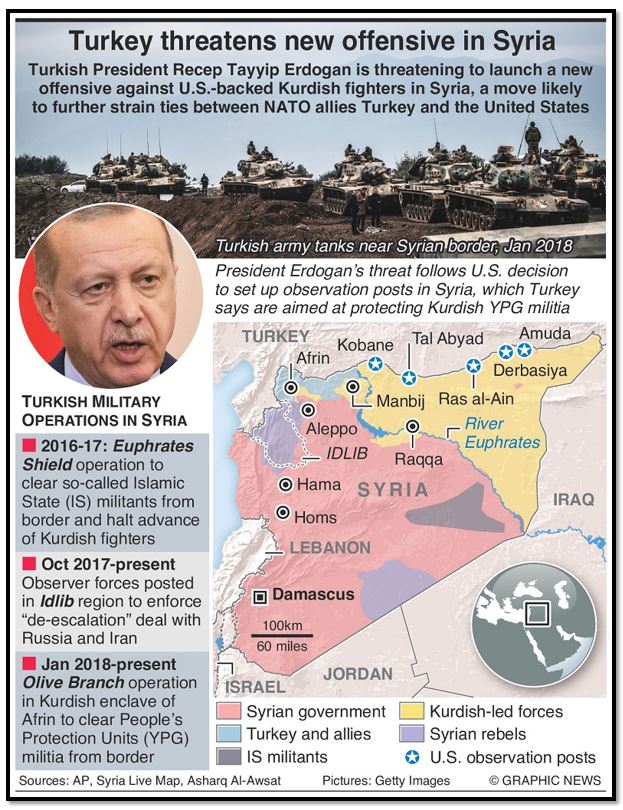 |
| Turkey's policy toward the Syrian Border [AP] |
Turkey’s operation came days after receiving clear messages that the membership of Syria could be re-established in the Arab League after a seven-year absence. Syria was suspended from the Arab League in 2011, after the regime forces mercilessly shoved non-violent protests across the country. However, the recent brief affable handshake between Ahmed Aboul Gheit Arab League Secretary General and Walid Muallem Syrian foreign minister on the side-lines of the recent UN General Assembly showed signs of a looming reconciliation between the regime in Damascus and the Arab coalition. Saudi Arabia’s close ally, the United Arab Emirates, has already re-established relations with Damascus in December 2018. (31) For the Arab League and Israel, the American abandonment of Syria boosted Russia’s stance as the sole global power active in Syria. Tel Aviv and Riyadh now expect Tehran to consolidate its involvement in Syria. This shift could ultimately be translated not only into a mounting military capability to move arms from Iran through Iraq and Syria to Hezbollah in Lebanon, but also to a unified axis of hostile entities to Israel and the Saudis. For them, this new situation would pose an instantaneous security threat.
More importantly, these Middle Eastern countries, like the Kurdish group YPG, are allies of the U.S. current administration. Trump’s declaration of withdrawal from Syria has left them in an unenviable dilemma. This policy shift has raised new questions about their own respective strategic partnerships with Washington. For years, the foreign policies of Saudi Arabia, UAE, Kuwait, Egypt, and Israel have relied almost exclusively on the belief that when they face any major challenges, they resort back to the United states to save and back them up. Saudi Arabia considers the U.S. its main defensive shield vis-à-vis Iran’s alleged hegemony and expansionist policy in the region. Similarly, staunch ties with the United States have been its most instrumental weapon and saviour for Israel. The recent developments inside Syria have made these countries – American allies – wonder whether their long-standing strategy of trust the United States is well founded.
It would too simplistic to hypothesize that the U.S. foreign policy would put the YPG, Israel and the Gulf States in one American basket. Washington has long considered Israel’s survival and security an indispensable obligation and one of its own national interests. Additionally, the Israeli lobby in Washington is far influential and effective as ever. For Israel, Trump has proven that he is a heavenly given president who gives without limits or conditions. He has demonstrated this generous policy through the relocation of the U.S. Embassy from Tel Aviv to Jerusalem. He has also supported Israel in the annexation to the occupied Golan Heights. (32) Some critics may characterize Trump as an erratic and impulsive president, who might look unfazed by what the establishment, media and other pressure groups or institutions think; yet Israel remains his Middle East policy’s redline.
The real concern about Trump’s shifting options should be among Saudi leaders in Riyadh more than any other capital. They should have their alarm bells rung much earlier than Trump’s abandonment of an ally in the region. When Yemen’s Iran-backed Houthi rebels attacked Saudi Arabia’s oil installations, the Trump administration swiftly accused Iran of plotting the assault. Trump even alluded to the chance of an imminent massive military action against three targets inside Tehran. Ultimately, Trump retreated and decided to halt the plan of action at the Pentagon. (33) The Saudis could have reflected on this Trumpian political mind-set, despite their strong business corporation with the Trump administration. They should realize they would be on their own if they pick up a fight and decide to go on an all-out military confrontation with Iran. At that time, Riyadh decided to soften its stance towards Tehran, embraced a reconciliatory approach to alleviate tension, and gave room to mediation and peaceful talks. Trump’s latest decision to withdraw his forces from Syria coincided with sending more troops to Saudi Arabia, and deploying more military personnel to the U.S. military bases in the Gulf. Yet, this tactful shift has not dispersed the panic in Riyadh since by Washington will exit Syria during Turkey's operation against the YPG.
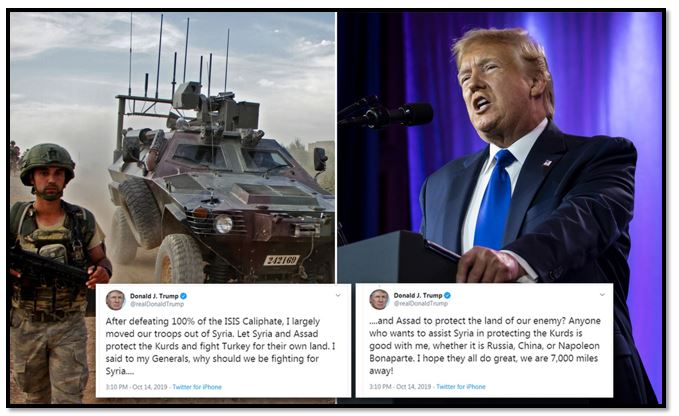 |
| Trump's View on Syria [AP] |
Iran: Turkey’s Regional Rival or Partner?
From day one of Turkey’s operation inside Syria, Tehran expressed opposition to Ankara’s plans to establish a "safe zone" in northern Syria. (34) However, Iran does not seem to be in a good position to get involved in serious disagreement or to alienate Turkey. To Iran, Turkey is undoubtedly an essential economic partner that helps the Iranian economy face the U.S. crippling sanctions. Furthermore, Iran is need of Turkey as a partner in the Astana peace talks that seek to end the conflict and secure political reconciliation in Syria.
Iran remains eager to see full withdrawal of the American troops from Syria and re-established control of the Syrian regime over the territories. Feeling abandoned or betrayed by the Americans, The YPG has opted to strike a deal with the Syrian regime and requested the deployment of Syrian troops into the Turkish border. Such a move can be strategically brilliant for the Iranians.
Iran welcomed the Turkish-Russian deal of cease-fire. It also maintains the political value of the Adana accord as a promising basis for future cooperation between Syria and Turkey in securing the shared border and combating terrorism. From the Iranian perspective, any revival of the Agreement explicitly represents Ankara’s recognition of the Syrian regime’s legitimacy. It would also stop Turkish forces’ advancement deep into Syrian provinces.
Like Turkey, Iran hosts a sizable minority of Kurds who embrace strong aspirations for an independent Kurdish state, which may jeopardize Iran’s territorial integrity and national security. Thus, Turkey’s Operation has dispersed this dream from coming true. However, these shifts do not necessarily mean that the new status quo, deriving from the Turkish military action or the Russian-Turkish deal, has boosted Iran’s regional interests. Undeniably, Moscow has come out as the main winner and boosted its power as the king maker and breaker in Syria. Iran now enjoys little leverage if compared to Turkey and Russia.
Conclusion
Tukey’s operation to tackle the security threats along its border and create a safe zone to accommodate Syrian refugees was inevitable. It started with the consent of the American administration and Russia. Both powers claimed to have achieved major inroads in Syria. Trump pulled out his troops and killed the chief of Daesh. He also maintained to protect the American interests and oil fields in Syria. However, the Russians have strategically boosted their powerful influence in Syria by reaching an agreement, with the Turkish government, on a long-term ceasefire, which would pave the way for the Syrian regime to expand its control of the northern territories.
The biggest loser of the October’s chess game turned to be America’s regional allies. They are now more concerned with a daunting question: is the U.S. as a trustworthy ally? Turkey has established itself as an influential player in Syria and Middle East by implementing and agenda, which may not appease the American Administration or the European players. The main challenge for Turkey remains its ability to deliver on promises to the vulnerable refugees who have built hopes. Syrian refugees need to have more patience and wait to see if the Turkish Operation will eventually bring them back to a safe, liveable and viable zone in their devastated country.
- Ulgen, S (2019) ‘The Way Forward in Syria’ The New York Times, 16 October. https://www.nytimes.com/2019/10/16/opinion/syria-turkey.html (accessed 20 October 2019)
- Gilani, I (2019) ‘YPG/PKK terrorists seek Israel’s help against Turkey’ Anadolu Agency, 23 October. https://www.aa.com.tr/en/middle-east/ypg-pkk-terrorists-seek-israel-s-help-against-turkey/1623428 (accessed 26 October 2019).
- Wikipedia (2015) ‘Kurdistan Workers' Party’ Wikipedia 26 March. https://en.wikipedia.org/wiki/Kurdistan_Workers%27_Party (accessed 15 October 2019)
- Daily News (2015) ‘Barzani gets warm welcome in Ankara amid Turkey-Iraq tensions’ Daily News, 9 December http://www.hurriyetdailynews.com/barzani-gets-warm-welcome-in-ankara-amid-turkey-iraq-tensions--92319 (accessed 17 October 2019)
- Daily Sabah (2019) ‘PKK finances crimes in Turkey with funds made from illegal activities in Europe, ex-German FM says’ 19 October. https://www.dailysabah.com/war-on-terror/2019/10/19/pkk-finances-crimes-in-turkey-with-funds-made-from-illegal-activities-in-europe-ex-german-fm-says (accessed 20 October 2019)
- Wikipedia (2019) ‘Iraqi Kurdistan’ 25 October. https://en.wikipedia.org/wiki/Iraqi_Kurdistan (accessed 27 October 2019)
- Danforth, N (2018) ‘The Only Thing Turkey and the U.S. Can Agree On’ 10 January. https://www.nytimes.com/2016/08/03/world/europe/turkey-coup-erdogan-fethullah-gulen-united-states.html (accessed 15 October 2019
- Aljazeera (2017) ‘Trump to send arms to Kurdish YPG in Syria’ Aljazeera, 10 May. https://www.aljazeera.com/news/2017/05/trump-send-arms-kurdish-ypg-syria-170509190404689.html (accessed 15 October 2019)
- Landler M, Cooper H, and Schmitt E (2018) ‘Trump to Withdraw U.S. Forces From Syria, Declaring ‘We Have Won Against ISIS’ The New York times 19 December. https://www.nytimes.com/2018/12/19/us/politics/trump-syria-turkey-troop-withdrawal.html (accessed 16 October 2019)
- Cook, S (2019) ‘There’s Always a Next Time to Betray the Kurds’ Foreign Policy, 11 October. https://foreignpolicy.com/2019/10/11/kurds-betrayal-syria-erdogan-turkey-trump/ (accessed 15 October 2019
- Goldenberg, I and Heras, N (2018) ‘Obama’s ISIS policy is working for Trump’ the Washington Post, 25 January. https://www.washingtonpost.com/news/posteverything/wp/2018/01/25/obamas-isis-policy-is-working-for-trump/ (accessed 15 October 2019)
- Fahim, K and others (2019) ‘Trump says a limited number of troops will remain in Syria after ordering a complete withdrawal’ the Washington Post, 21 October. https://www.washingtonpost.com/world/middle_east/us-discussing-proposal-to-leave-troops-around-syrias-oil-fields-pentagon-says/2019/10/21/0b024d4c-f401-11e9-8cf0-4cc99f74d127_story.html (accessed 25 October 2019)
- Perry, T and Coskun, O (2018) ‘U.S.-led coalition helps to build new Syrian force, angering Turkey’ Reuters, 14 January.https://uk.reuters.com/article/uk-mideast-crisis-syria-sdf/u-s-led-coalition-helps-to-build-new-syrian-force-angering-turkey-idUKKBN1F30OE (accessed 15 October 2019)
- Borger, J and Safi, M (2019) ‘Trump claims Kurds 'no angels' as he boasts of his own 'brilliant' strategy’ the Guardian. October, 16. https://www.theguardian.com/us-news/2019/oct/16/trump-claims-kurds-are-much-safer-as-us-troops-leave-syria (accessed 18 October 2019)
- Vazquez, M ‘2019) ‘Trump threatens to 'obliterate' Turkey's economy if they do anything 'off limits' with ISIS’ CNN, 8 October. https://edition.cnn.com/2019/10/07/politics/donald-trump-syria-obliterate-turkey-isis/index.html (accessed 15 October 2019)
- Daragahi, B (2019) ‘Erdogan says Turkey will take necessary steps against Trump’s ‘disrespectful’ letter’ the Independent, 18 October. https://www.independent.co.uk/news/world/europe/erdogan-turkey-trump-letter-syria-ceasefire-latest-response-a9161626.html (accessed 19 October 2019)
- Martosko, D (2019) ‘Donald Trump lifts ALL sanctions on Turkey as he claims ceasefire is 'beyond expectations' and Kurds are safe - but admits it is not permanent and says U.S. troops ARE staying’ Daily Mail, 23 October. https://www.dailymail.co.uk/news/article-7605009/Donald-Trump-claims-big-success-Turkey-Syria-border-says-ceasefire-holding.html (accessed 26 October 2019)
- Relman, E (2019) ‘Trump thanks Russia and other nations for helping with the US mission to kill ISIS leader al-Baghdadi’ Business Insider, 27 October. https://www.businessinsider.com/trump-thanks-russia-help-mission-kill-abu-bakr-al-baghdadi-2019-10?r=US&IR=T (accessed 27 October 2019)
- Hennigan, W.J. (2019) ‘Litany of Defeat: Trump Defends Rising Costs of 'Strategically Brilliant' Mideast Retreat’ Time, 17 October. https://time.com/5702769/litany-of-defeat-trump-defends-rising-costs-of-strategically-brilliant-mideast-retreat/ (accessed 23 October 2019)
- Wikipedia (2019) ‘Russian naval facility in Tartus’ Wikipedia 28 September. https://en.wikipedia.org/wiki/Russian_naval_facility_in_Tartus (accessed 15 October 2019)
- Troianovski, A and Kingsley P (2019) ‘Putin and Erdogan Announce Plan for Northeast Syria, Bolstering Russian Influence’ the New York Times, 22 October. https://www.nytimes.com/2019/10/22/world/europe/erdogan-putin-syria-cease-fire.html (accessed 24 October 2019)
- Younis, A (2019) ‘What does the Adana deal mean for Turkey and Syria?’ Aljazeera, 23 October. https://www.aljazeera.com/news/2019/10/analysis-adana-deal-turkey-syria-191022194719603.html (accessed 28 October 2019)
- TRT World (2019) ‘'YPG/PKK’s freeing Daesh members for money suits them' - Peace Spring’ TRT World, 28 October. https://www.trtworld.com/turkey/ypg-pkk-s-freeing-daesh-members-for-money-suits-them-peace-spring-30471 (accessed 28 October 2019)
- Daily News (2019) ‘Syrian regime entering Manbij not negative if YPG eliminated: Erdo?an’ Daily News, 16 October. http://www.hurriyetdailynews.com/erdogan-says-turkey-not-worried-over-sanctions-147544 (accessed 25 October 2019)
- Rasgon, A (2019) ‘Syrian Kurdish military official calls on Israel to take action against Turkey’ Times of Israel, 20 October. https://www.timesofisrael.com/syrian-kurdish-military-official-calls-on-israel-to-take-action-against-turkey/ (accessed 27 October 2019)
- Kabalan, M (2019) ‘How Turkey's 'Peace Spring' changed the dynamics of Syria's war’ Aljzeera, 14 October. https://www.aljazeera.com/indepth/opinion/turkey-peace-spring-changed-dynamics-syria-war-191014165613108.html (accessed 26 October 2019)
- Alarabiya English (2019) ‘Arab foreign ministers condemn Turkish offensive in Syria’ Alarabiya English, 12 October. http://english.alarabiya.net/en/News/gulf/2019/10/12/Al-Jubair-Saudi-Arabia-condemns-Turkish-offensive-in-Syria.html (accessed 20 October 2019)
- Perry, T and Coskun, O (2018) ‘U.S.-led coalition helps to build new Syrian force, angering Turkey’ Reuters, 14 January. https://www.reuters.com/article/us-mideast-crisis-syria-sdf/u-s-led-coalition-helps-to-build-new-syrian-force-angering-turkey-idUSKBN1F30OA (accessed 26 October 2019)
- Middle East Monitor (2018) ‘Saudi Arabia, UAE send troops to support Kurds in Syria’ MEMO, 22 November. https://www.middleeastmonitor.com/20181122-saudi-arabia-uae-send-troops-to-support-kurds-in-syria/ (accessed 25 October 2019)
- Mourad, M (2017) ‘Syrian opposition figure to deploy all-Arab force in Raqqa offensive’ Reuters, 1 February. https://uk.reuters.com/article/uk-mideast-crisis-syria-jarba/syrian-opposition-figure-to-deploy-all-arab-force-in-raqqa-offensive-idUKKBN15G51W (accessed 26 October 2019)
- The New Arab (2019) ‘Signs of rapprochement after Syria regime and Arab League officials seen in warm exchange’ the New Arab, 28 September. https://www.alaraby.co.uk/english/news/2019/9/27/syrian-foreign-minister-and-arab-league-head-meet (accessed 26 October 2019
- Borger, J (2019) ‘Trump says US will recognize Israel's sovereignty over Golan Heights’ the Guardian, 21 March. https://www.theguardian.com/us-news/2019/mar/21/trump-us-golan-heights-israel-sovereignty (accessed 27 October 2019)
- The Guardian (2019) ‘Pompeo: Iran behind attack on Saudi oil facilities that will reduce kingdom's output’ the Guardian, 15 September. https://www.theguardian.com/world/2019/sep/14/pompeo-iran-saudi-arabia-oil-yemen-houthi (accessed 27 October 2019)
- Pleasance, C (2019) ‘Turkey fires first shots: Ankara bombs Kurdish supply route’ the Daily Mail, 8 October. https://www.dailymail.co.uk/news/article-7549407/Turkey-says-ready-create-peace-corridor-northern-Syria.html (accessed 27 October 2019)
